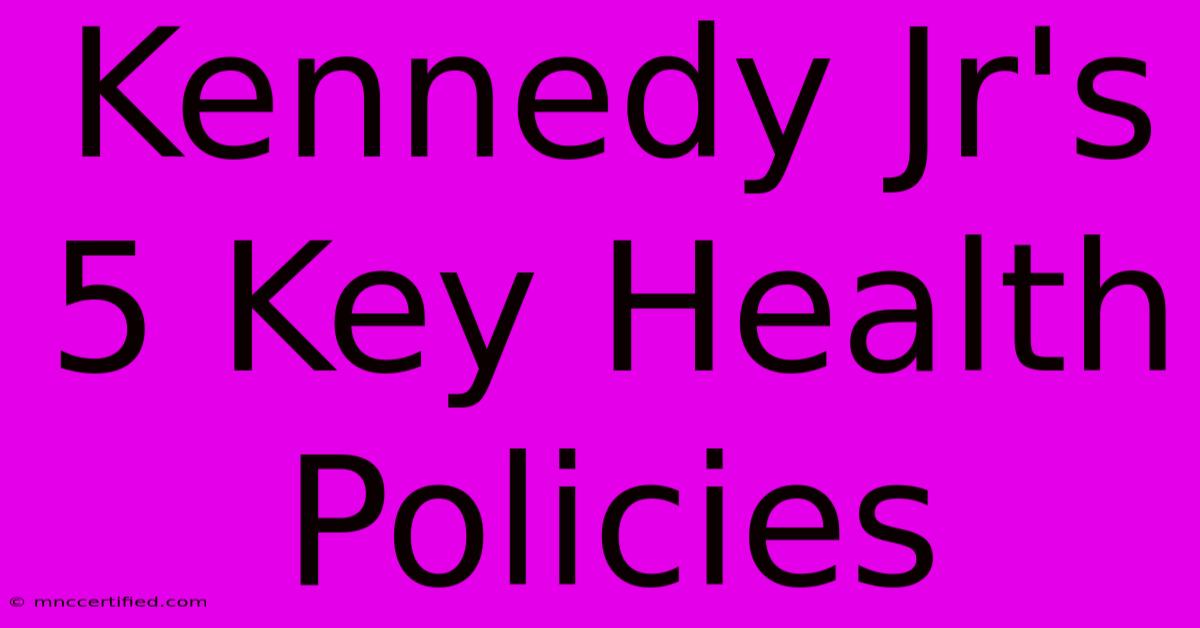Kennedy Jr's 5 Key Health Policies

Table of Contents
Kennedy Jr.'s 5 Key Health Policies: A Deep Dive
Robert F. Kennedy Jr.'s platform on health issues has garnered significant attention, sparking considerable debate. While not all his proposals are universally accepted, understanding his key policy positions is crucial for informed discussion. This article delves into five core tenets of Kennedy Jr.'s health policy platform, examining their potential impact and controversies. We'll analyze these policies through a critical lens, exploring their feasibility and potential consequences.
1. Vaccine Safety and Choice: A Central Focus
Kennedy Jr.'s most prominent stance centers on vaccine safety and informed consent. He advocates for increased research into potential vaccine side effects and strongly emphasizes the right of individuals to choose whether or not to vaccinate themselves or their children. This position frequently clashes with mainstream medical consensus, which overwhelmingly supports vaccination as a safe and effective public health measure.
The Controversy: Risk vs. Benefit
The core of the controversy lies in balancing individual autonomy with the collective benefit of herd immunity. Kennedy Jr.'s critics argue that his rhetoric downplays the overwhelming scientific evidence supporting vaccine safety and efficacy, potentially contributing to vaccine hesitancy and outbreaks of preventable diseases. Proponents, however, highlight the importance of addressing concerns about potential adverse events and ensuring transparency in research. Understanding both sides of this complex issue is vital for a nuanced perspective.
2. Addressing Environmental Toxins: A Holistic Approach
Kennedy Jr. champions a holistic approach to health, emphasizing the impact of environmental toxins on public health. He advocates for stricter regulations on pesticides, heavy metals, and other pollutants, arguing that these substances contribute significantly to various health problems. This aligns with a growing body of research exploring the link between environmental exposures and chronic diseases.
The Challenge: Regulation and Enforcement
The challenge here lies in implementing and enforcing effective regulations. Identifying and regulating a vast array of potential toxins requires substantial scientific research, regulatory capacity, and political will. Moreover, balancing environmental protection with economic considerations presents a significant hurdle. Kennedy Jr.'s proposals highlight the urgent need for a more comprehensive strategy to mitigate the health impacts of environmental pollution.
3. Promoting Natural and Integrative Medicine: An Alternative Perspective
Kennedy Jr. advocates for integrating natural and integrative medicine into mainstream healthcare. He suggests exploring alternative therapies alongside conventional treatments, arguing that a more holistic approach can lead to better patient outcomes. This aligns with a growing interest in complementary and alternative medicine (CAM), though the efficacy of many CAM therapies remains under scrutiny.
The Need for Evidence-Based Practices
The critical aspect here is the need for rigorous scientific evidence to support the efficacy and safety of these alternative treatments. Integrating CAM into mainstream healthcare necessitates robust clinical trials and a careful evaluation of potential risks and benefits. The focus should be on evidence-based practices, not on unproven or potentially harmful therapies.
4. Expanding Access to Affordable Healthcare: A Key Priority
Access to affordable healthcare remains a central theme in Kennedy Jr.'s platform. He advocates for policies that would expand access to quality, affordable care for all Americans, regardless of their socioeconomic status. This aligns with a broader national conversation about healthcare reform and the need for more equitable access to medical services.
Addressing Systemic Inequalities
Addressing healthcare disparities requires a multi-faceted approach. It involves not just expanding insurance coverage, but also tackling the underlying social determinants of health, such as poverty, lack of education, and inadequate access to healthy food and housing. Kennedy Jr.'s proposals should be viewed within this broader context of systemic inequalities that impact health outcomes.
5. Empowering Patients Through Informed Consent: A Fundamental Right
Kennedy Jr. consistently emphasizes the importance of informed consent in healthcare decisions. He advocates for greater transparency and patient empowerment, arguing that individuals should have the right to access complete information and make informed choices about their own health. This resonates with a growing movement towards patient-centered care and shared decision-making.
The Importance of Transparency
The ethical and practical implications of informed consent are substantial. It requires clear and accessible communication from healthcare providers, along with the resources for patients to understand complex medical information. Kennedy Jr.'s emphasis on informed consent underscores the crucial role of patient autonomy in healthcare.
Conclusion:
Robert F. Kennedy Jr.'s health policy positions represent a complex and often controversial set of proposals. While some of his viewpoints align with broader societal concerns about healthcare access and environmental protection, others are highly debated within the scientific and medical communities. Understanding the nuances of his proposals, including both their potential benefits and drawbacks, is essential for fostering a productive dialogue about the future of healthcare. Critical analysis, grounded in scientific evidence and ethical considerations, is crucial for evaluating the merit of these policy suggestions.

Thank you for visiting our website wich cover about Kennedy Jr's 5 Key Health Policies. We hope the information provided has been useful to you. Feel free to contact us if you have any questions or need further assistance. See you next time and dont miss to bookmark.
Featured Posts
-
Portugal Vs Poland Uefa Nations League Timings
Nov 16, 2024
-
Robert F Kennedy Jrs 5 Health Stances
Nov 16, 2024
-
49ers Bills Watch Party At Thrive City
Nov 16, 2024
-
Uefa Nations League Portugal Poland Match Time
Nov 16, 2024
-
Scotland Croatia Live Nations League Match
Nov 16, 2024